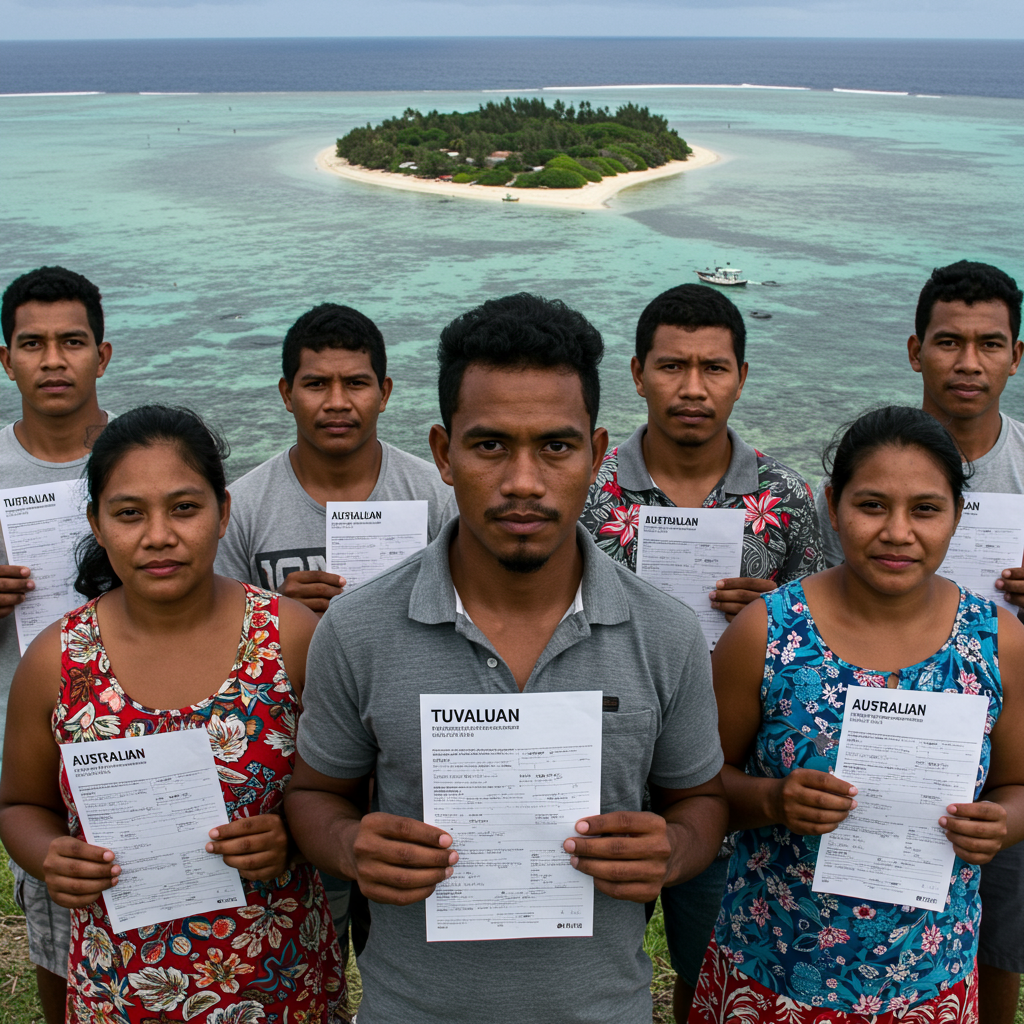A historic moment is unfolding as citizens of the low-lying Pacific island nation of tuvalu face the stark reality of climate change. More than a third of the nation’s population has applied for the first intake of a unique visa program offered by australia. This overwhelming response underscores the urgent need for pathways addressing climate-related displacement.
Launched by Australia’s foreign affairs department, the program is widely seen as a landmark approach to a growing global challenge. It offers permanent residency in Australia to Tuvaluan citizens, providing a potential lifeline for those whose homeland is under existential threat from rising seas. The application window, which opened on June 16, saw a massive influx of registrations by its close on July 18.
Tuvalu: A Nation on the Frontline of Climate Change
Tuvalu stands as one of the world’s most vulnerable nations to the impacts of a warming planet. Situated roughly halfway between Australia and Hawaii, this archipelago of reef islands and atolls has an average elevation of less than three meters (under 10 feet). Its highest point is a mere five meters (16 feet) above sea level.
This extreme low elevation makes Tuvalu exceptionally susceptible to rising sea levels, storm surges, and coastal erosion. Scientific projections paint a dire picture. NASA scientists predict that by 2050, much of Tuvalu’s land mass and critical infrastructure could sit below the level of the current high tide.
The effects are already tangible for Tuvaluans. Saltwater intrusion is contaminating precious freshwater sources and degrading fertile land. This makes traditional farming increasingly difficult and forces reliance on rainwater collection and raised gardens. The World Bank notes that many of Tuvalu’s islands could become uninhabitable before the end of the century due to these combined factors. Funafuti, the capital and most populated atoll, has seen sea levels rise about 1.5 times the global average over the past three decades, with projections suggesting half its area could be submerged by daily tides by 2050.
The Australia-Tuvalu Falepili Union: A Unique Pact
The climate visa program is a direct outcome of the Australia-Tuvalu Falepili Union treaty. This groundbreaking agreement, announced in August 2024, signifies a deep and multi-faceted partnership between the two nations. The term “Falepili” itself reflects the traditional values of good neighbourliness, care, and mutual respect.
Beyond the migration pathway, the Union includes significant security commitments from Canberra. Australia has pledged to assist Tuvalu in the face of natural disasters, public health emergencies, and even military aggression. This positions Australia as Tuvalu’s primary security partner in the region.
A particularly unique element of the Falepili Union is Australia’s commitment to legally recognize Tuvalu’s future statehood and sovereignty. This recognition is pledged despite the potential detrimental impact of climate change-induced sea level rise, which could reduce the nation’s physical territory. Tuvalu’s Prime Minister, Feleti Teo, highlighted the historical significance of this, noting it as the first time a country has legally committed to recognizing another’s future sovereignty under such circumstances. The treaty thus provides a framework for both physical refuge and the preservation of national identity.
The Pacific Engagement Visa: A Highly Sought Pathway
The specific migration route established under the Falepili Union is known as the Pacific Engagement visa, sometimes referred to as the Falepili Mobility Pathway. This program offers a chance for permanent relocation to Australia.
Crucially, entry into this program for Tuvaluans is managed through a random ballot system. Unlike many immigration streams, it is not based on skills, education, or other criteria. This approach aims to provide an equitable chance for all citizens to apply. However, the number of visas available is strictly limited. Only 280 visas will be awarded to Tuvalu citizens through this annual random ballot.
The application process for the 2025 intake required a fee of A$25 (approximately £11.93 or $16.37 USD at the time). The ballot opened on June 16 and closed on July 18, reflecting a tight application window for interested citizens.
Overwhelming Demand: One in Three Apply
The initial response to the visa ballot has been nothing short of staggering. Just days after opening, the program saw a massive surge in applications, indicating it will be significantly oversubscribed.
As of June 27, only eleven days into the application period, 1,124 applications had been submitted. These applications collectively covered a total of 4,052 Tuvaluan citizens, including family members.
Considering Tuvalu’s total population stands at 10,643 people (based on 2022 census figures), these applications represent approximately 38% of the entire nation’s population seeking a chance to migrate through this pathway in the first intake. This figure vividly illustrates the level of concern and urgency felt by Tuvaluans regarding their future in the face of climate change. The sheer number of applicants versus the 280 available spots means thousands will inevitably be unsuccessful in this first round.
Support and Opportunity in Australia
For the individuals and families fortunate enough to be selected through the ballot, the Pacific Engagement visa offers comprehensive support upon arrival in Australia. Successful applicants are granted indefinite permanent residency, providing security and the ability to travel freely in and out of the country.
The visa also provides access to essential Australian support systems. This includes the national healthcare system (Medicare), enabling access to medical services. Families gain access to childcare subsidies and family tax benefits. Visa holders can study at Australian schools, universities, and vocational training facilities with the same level of subsidization as Australian citizens. Access to the National Disability Insurance Scheme (NDIS) is also provided. These provisions aim to facilitate integration and provide a stable foundation for new residents.
Perspectives on the Future
The establishment of this migration pathway is viewed from different perspectives. Australian High Commissioner to Tuvalu, David Charlton, described it as a “significant moment” demonstrating Australia’s “ongoing commitment” to Tuvalu.
Tuvalu’s Prime Minister Feleti Teo acknowledged the necessity of the pathway but also expressed hope for a different future. He believes that while many will seek opportunities in Australia, many Tuvaluans would ultimately choose to remain in their homeland. He also sees the pathway as a “two-way traffic,” potentially allowing citizens to gain skills and experience abroad before returning to contribute to Tuvalu’s development.
Despite its humanitarian purpose, the treaty and the migration component have also faced criticism. Some observers have described the agreement as potentially neo-colonialist, raising concerns about Australia’s influence and the long-term implications for Tuvalu’s sovereignty and population base.
Tuvalu’s Efforts to Adapt and Endure
Even as many citizens seek migration pathways, Tuvalu is actively pursuing strategies to adapt to climate change and preserve its land and identity. Projects like the Tuvalu Coastal Adaptation Project (TCAP), launched in 2017, are working to combat sea-level rise through coastal protection measures and land reclamation.
Recognizing the potential loss of physical territory, the government is also undertaking an innovative project to create a digital replica of the country. This digital twin aims to archive Tuvalu’s history, culture, and government functions, ensuring the nation’s legacy and statehood can potentially endure even if its land mass is submerged.
Frequently Asked Questions
Why are Tuvaluans seeking Australia’s climate visa?
Tuvalu is one of the world’s lowest-lying nations, facing an existential threat from climate change-induced sea level rise. Rising seas cause flooding, saltwater intrusion, and erosion, making the islands increasingly difficult to inhabit and sustain traditional livelihoods. Thousands of citizens are applying for the Australian visa out of concern for their future safety and security.
What benefits does the Australia-Tuvalu climate visa offer?
The Pacific Engagement visa grants successful Tuvaluan applicants permanent residency in Australia. This status provides access to essential services including the Medicare health system, childcare subsidies, family benefits, access to the National Disability Insurance Scheme (NDIS), and the ability to study at Australian educational institutions at the same subsidized rates as citizens.
What is the Australia-Tuvalu Falepili Union treaty?
Announced in August 2024, the Falepili Union is a comprehensive bilateral agreement between Australia and Tuvalu. It establishes a security pact where Australia commits to defending Tuvalu against various threats. Crucially, it also creates the unique climate migration pathway and includes Australia’s commitment to legally recognize Tuvalu’s statehood and sovereignty, even if the nation loses territory due to climate change.
The urgency reflected in the visa application numbers is a stark reminder of the human cost of climate change. The innovative Australia-Tuvalu Falepili Union represents a significant, albeit complex, attempt to address climate displacement and recognize national sovereignty in the face of unprecedented environmental challenges. As the world watches Tuvalu’s struggle, its situation serves as a potential preview for other vulnerable island nations and highlights the critical need for global action and adaptive strategies.
Word Count Check: 1141 words



